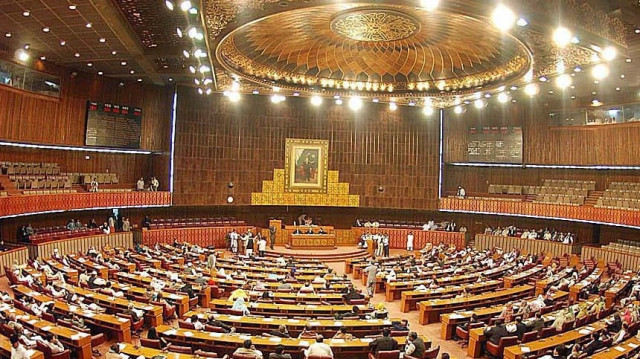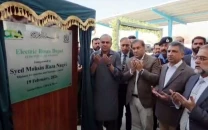Electoral reforms: Parliament may show the door to upstarts
Proposed laws include barring those parties from taking part in elections that did not secure a single seat

Proposed laws include barring those parties from taking part in elections that did not secure a single seat. PHOTO: APP/FILE
In what appears to be a classic “entry deterrence” policy, Parliament is poised to introduce a slew of stringent laws to discourage “non-serious” parties and candidates from contesting the next parliamentary elections.
The proposed laws include barring those parties from taking part in elections that did not secure a single seat or had failed to obtain at least five per cent of the total votes cast in the constituencies from where their candidates contested last three elections.
The move is part of the amendments a special parliamentary committee on electoral reforms is going to finalise in its December 31 meeting before tabling them in Parliament for approval.
Headed by Senator Jahangir Badar, the secretary general of the ruling Pakistan Peoples Party (PPP), the special panel has adopted many of the proposals put forward by the Election Commission of Pakistan (ECP) in the proposed reforms package but dropped several other key proposals.
The draft of amendments prepared by the committee has widened the definition of corrupt practices and included capturing of polling stations and tampering with ballot papers under corrupt practices. It also proposed a three-year jail term for culprits besides a Rs100,000 fine.
The draft also stipulates that those political parties which don’t have a central office and district offices in at least 10 districts and tehsils would not be allocated election symbols.
Under the existing laws, a political party has to fulfil only three conditions to apply for election symbols: provide a list of its office-bearers, declaration that it conducted some kind of intra-party elections and statement of its financial accounts.
Since there is no mechanism to verify the authenticity of these statements, the ECP has demanded the committee enact some laws empowering the commission to verify such statements. It has also demanded a legal cover to its proposed plan by establishing a “political finance wing” — a department that would verify asset statements of every lawmaker and political parties.
Interestingly, these proposals have been dropped in the amendments the committee has finalised.
Money matters
According to the draft of the proposed amendments, the limit of the election expenses will be enhanced from Rs1.5 million to Rs6 million for a National Assembly candidate, and from Rs1 million to Rs4 million for a provincial assembly candidate. However, the draft does not specify how the ECP would verify if the proposed limit was not crossed.
It has also been proposed that every candidate would have to deposit Rs50,000 as security deposit for National Assembly and Rs25,000 for provincial assembly. Currently, the required deposit stands at Rs4,000 and Rs2,000, respectively. The stipulation adds that this deposit will be forfeited if the candidate doesn’t secure one fourth of the total number of votes cast in that constituency.
Ensuring transparency
In an effort to ensure transparency, the committee has decided that now the list of all polling stations will be made public with the announcement of the election schedule — almost two months before the polling day.
Voters and political parties would be given opportunity to file complaints against proposed sites of polling stations within a specified period but once this period lapses there will be no change of the notified site.
It is a common complaint that returning officers often change the site of polling stations a night before the polling day to take undue political advantage.
ECP powers
The ECP has also sought powers to take disciplinary action against any official, civil or military, who is found guilty of tampering with polls. The draft mentions this demand but it is unclear if the parliamentary panel and Parliament is ready to give the ECP such powers.
Currently, the ECP can just recommend action against such officials and the power to take action rests with the parent department of the official concerned.
Financial autonomy
Another important matter missing from the proposed amendments is the commission’s demand to have a complete financial autonomy like the Supreme Court and the National Assembly Secretariat – but this demand also appears to be missing from the draft.
The Jahangir Badar-led committee will be meeting on December 31 to give final touches to the proposed draft which is likely to be presented and passed by Parliament before the next general elections.
Published in The Express Tribune, December 30th, 2012.



















COMMENTS
Comments are moderated and generally will be posted if they are on-topic and not abusive.
For more information, please see our Comments FAQ